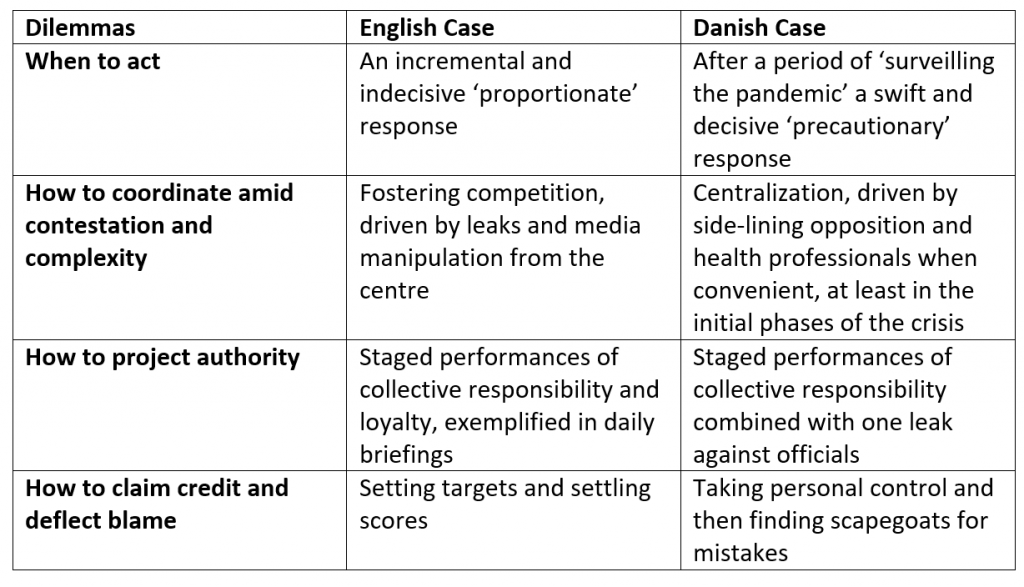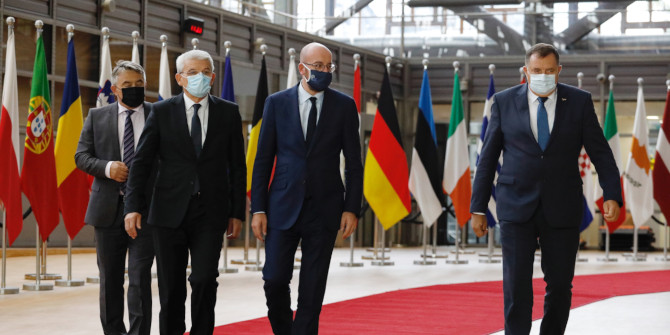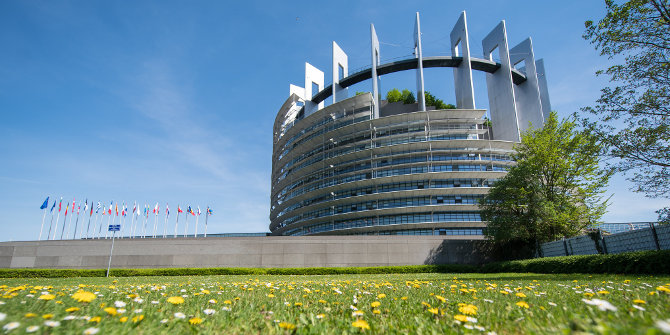What explains the different responses of European countries to Covid-19? Drawing on a new study, John Boswell, Jack Corbett, Rod Rhodes and Heidi Houlberg Salomonsen set out a ‘court politics’ model of how governing elites have taken advice and made decisions during the pandemic.
Dominic Cummings’ ‘Domshell’ testimony to the ‘Coronavirus: Lessons Learnt Inquiry’ in May was pure political box office. It was set-piece theatre orchestrated for a notorious renegade, recently at the heart of Westminster, to spill the beans on the Johnson government’s dysfunctions and settle scores with key actors still centrally involved in managing the pandemic response and running the country.
The press had – and continued to have – a field day with the revelations. But many in-the-know insist that much of Cummings’ testimony was common knowledge in the dusty corridors and clandestine WhatsApp chains of Westminster and Whitehall. Was this just another episode in the Downing Street soap opera, a distraction drawing attention away from meaningful scrutiny of governance failures in the Covid-19 response?
The court politics of crisis
Certainly, in the more serious and staid world of policy analysis, the gossip, intrigue and power struggles that typify political journalism tend to get short thrift. The traditional emphasis is on structural features – consensual vs majoritarian, centralised vs decentralised – rather than the everyday practices of elite actors.
But looking at comparative Covid-19 responses especially, we think that oversight is a mistake. Such structural features have little explanatory power for a pattern of crisis response that has defied easy categorisation. In a new study, we argue that the politicking of Cummings and other conspirators is no frivolous sideshow; it has had profound implications for way the government responds.
We call these everyday practices the ‘court politics’ of crisis. We present an interpretive, actor-centred approach that takes seriously the realpolitik of the governing elite. It focuses on the political leadership network of politicians, public servants, and political advisers at the heart of government, and the dilemmas they face in grappling with a crisis like the Covid-19 pandemic. The metaphor of ‘the court’ invokes a sense of the contingent and relational nature of executive decision making under pressure. But it is not merely a retreat into descriptive context. A ‘court politics’ approach has broader explanatory power because the actors in different courts respond to similar sorts of dilemmas in times of crisis.
Covid-19 responses in England and Denmark
To illustrate this potential, we compare how the ‘courts’ in England and Denmark have responded to the pandemic and its fallout. We choose these cases because the response in each has confounded institutionalist explanations. The famously consensus-oriented Denmark has seen a swift, decisive, centralised response. The strong executive model in England has seen a hesitant, confused, flip-flopping response. It is only by looking at the intimate inner circle of decision-making in both cases that we can make sense of this unexpected divergence.
We draw on the well-known typology of Arjen Boin and colleagues to parse out the dilemmas facing leaders in England and Denmark as the pandemic has progressed (summarised in the table below).
Table 1: Dilemmas during the Covid-19 pandemic
Note: For more information, see the authors’ accompanying paper in the Journal of European Public Policy.
First, there was an initial ‘sense-making’ dilemma about when to act. In England, key actors in the Johnson court failed to take the threat seriously and prevaricated before taking action. In Denmark, Prime Minister Mette Frederiksen acted more proactively – ahead of official advice – in taking swift and decisive action to lock down.
Next, there was a ‘decision-making’ dilemma about how to coordinate amid complexity and contestation as policymakers grappled to control the first wave of infection. In England, the Johnson court was mired in in-fighting between ‘hawk’ and ‘dove’ factions, and hamstrung by mutual hostility with leaders in devolved nations and local authorities. In Denmark, Frederiksen further consolidated her authority by marginalising the traditional influence of experts and other parties on policymaking.
Throughout, there has been a ‘meaning-making’ dilemma about how best to project authority. In both countries, despite the divergence in approach, leaders have sought to publicly manage the crisis through performances of collective responsibility (front stage), combined with leaking and media manipulation (backstage).
Now especially, there is an ‘accounting’ dilemma as actors seek to deflect blame for mistakes and claim credit for successes. In England, Johnson’s hands-off style has left other members of the court to play the ‘blame game’ – most notably in the conflict between the (now former) Secretary of State for Health and Social Care Matt Hancock and Cummings over successes and (especially) failures in the rollout of testing and surveillance programmes. In Denmark, Frederiksen’s hands-on style has seen her take personal responsibility for the overall ‘success’ of the response, while finding scapegoats for missteps along the way.
Understanding crisis politics
We know this analysis remains exploratory. There will be much more to say about the court politics of Covid-19. We had to make do with news reports, government inquiries, and some early insider accounts. In time, much richer data will come to light. Elites with insider knowledge will give further testimony at public hearings and write memoirs. Documents now dubbed too sensitive will enter the public record.
Interpretive analysts will be able to piece these sources together to provide a deeper, richer account of the ‘court politics’ at the centre of these important decisions. In the meantime, we hope our account will provide an inspiration and a template – conceptually and methodologically – for a compelling comparative understanding of crisis politics that can capture subtle patterns of variation and volatility.
For more information, see the authors’ accompanying paper in the Journal of European Public Policy
Note: This article gives the views of the authors, not the position of EUROPP – European Politics and Policy or the London School of Economics. Featured image credit: Andrew Parsons / No10 Downing St (CC BY-NC-ND 2.0)





